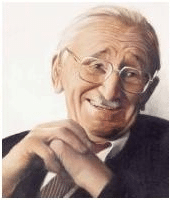When free-marketeer, Friedrich von Hayek, died in 1992 he left a legacy of neoliberal think tanks that would work against climate change. The DeSmog UK epic history series takes a look back at his life.
Friedrich von Hayek died in Freiburg, Germany, aged 92, on 23 March, 1992 – a few months after the Soviet Union voted for its own dissolution.
The funeral was attended by around one hundred family members and invited guests. It was a overcast and windy day. Vaclav Klaus, the finance minister and future prime minister of the former communist Czech Republic arrived late.
Hayek, the recipient of the Nobel Prize, had lived a fascinating life during a tumultuous period of history. He remained convinced of the “spontaneous order” of the free market and that inequality was an inescapable feature of human existence.
From his deathbed he told a reporter: “I believe in general that the idea of justice is more closely met by a freely competitive market than by any deliberate allocation of income to some imagined ideal of the kind”.
The Right Circumstances
His life is evidence of what a single man can achieve in the right circumstances, and as fellow neoliberal Antony Fisher would have said, the embodiment of the fact that ideas have consequences. He was awarded the presidential Medal of Freedom by President George Bush Senior in 1991, for example, but had been too frail to attend in person.
In 1947, Hayek founded the Mont Pelerin Society (MPS), an international group of economists, historians and philosophers; he was convinced the MPS was crucial to the triumph of neoliberalism around the world.
However, as his biographer Alan Ebenstein would note: “Hayek was virtually forgotten in England during the 1950s and ’60s. The London-based Institute of Economic Affairs [IEA]…became almost the only organization that continued to promote him and his work in the country during this period.”
In the United States, Hayek would also be directly involved with the Foundation for Economic Education (FEE), the American Enterprise Institute, the Heritage Foundation and Cato Institute. These think tanks, each tied to the Koch family’s fossil fortune, would each play a role in the rise of climate denial during the 1980s and ‘90s.
Not For All Men
Hayek’s free market philosophy did not mean total freedom for all men though.
He was, during his life, a keen supporter of General Augusto Pinochet, whose death squads tortured and murdered thousands of citizens following the overthrow of the democratically elected government of Salvador Allende in Chile during a military coup in 1973.
“Don’t confuse totalitarianism with authoritarianism,” Hayek said of Pinochet. “I don’t know of any totalitarian governments in Latin America. The only one was Chile under Allende. Chile is now a great success. The world shall come to regard the recovery of Chile as one of the great economic miracles of our time.”
Communism, therefore, was not despised because of the violence of revolution but instead because it posed a real threat to the private property of the wealthy. Hayek believed that only people who were over the age of 45 should be allowed to vote, and that people receiving benefits should have the right withdrawn.
Neighbourhood Effects
However, Hayek also considered himself an environmentalist; he supported the World Wildlife Fund and the National Trust in the UK.
He had argued that it is “often impossible to confine the effects of what one does to one’s own land to this particular piece; and hence arises those ‘neighbourhood effects’ which will not be taken into account so long as the owner has to consider only the effects on his property. Hence also the problems which arise with respect to the pollution of air or water and the like.”
This statement should light the way for those who now claim to carry his flame.
Up next: How the former IEA director general, John Blundell, recruited British students with a flair for free market economics to the US for internships at Koch-funded think tanks.
Photo: Volkswirtschaftliches Institut, Universität Freiburg via Wikimedia Commons
Subscribe to our newsletter
Stay up to date with DeSmog news and alerts







